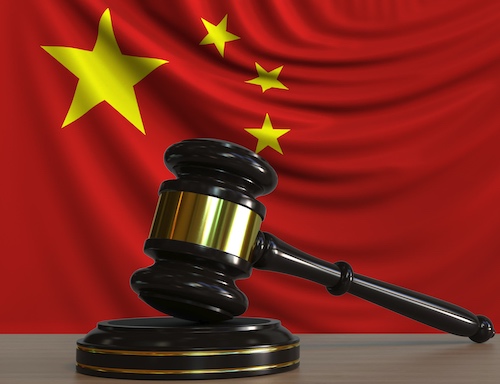“One would hope that U.S. policy officials, rather than acting to weaken U.S. patents [as they have recently] would focus instead on the threat to U.S. innovation and technology-driven growth stemming from the Chinese challenge to standardized patents.”
 Reasonable compensation for standard essential patent (SEP) holders is crucial to create the incentives for adequate investments in standards. In particular, high-quality standards have underlain the development and proliferation of the global wireless technologies that have played such a central role in the innovation-driven growth of the internet economy. (For the key role of strong standards in technological innovation, see, for example, here, here, here, and here). It follows that the discriminatory reduction of compensation for SEP holders would reduce their incentives to participate and invest in standard setting. This in turn would reduce quality of future standards that will be key to economic growth and vitality.
Reasonable compensation for standard essential patent (SEP) holders is crucial to create the incentives for adequate investments in standards. In particular, high-quality standards have underlain the development and proliferation of the global wireless technologies that have played such a central role in the innovation-driven growth of the internet economy. (For the key role of strong standards in technological innovation, see, for example, here, here, here, and here). It follows that the discriminatory reduction of compensation for SEP holders would reduce their incentives to participate and invest in standard setting. This in turn would reduce quality of future standards that will be key to economic growth and vitality.
Oppo v. Nokia
The issue of under-compensation for SEPs is starkly raised in Oppo v. Nokia, a December 2023 decision by a major Chinese tribunal, the Chongqing First Intermediate People’s Court. In its opinion (available only in Chinese), the Chongqing Court confirmed FRAND licensing rates for Nokia’s 2G, 3G, 4G, and 5G SEPs, setting per handset royalties that are far below those found on Nokia’s website. What’s more, the opinion set far lower licensing fees in China and other “less developed” jurisdictions than in more developed countries. This is the first Chinese judicial decision to set global fair, reasonable and non-discriminatory (FRAND) rates. Nokia is appealing the decision to China’s Supreme People’s Court.
A primary beneficiary of the holding is Oppo, a large Chinese electronics manufacturer that makes smartphones and many other sorts of devices. Since 2021, Oppo has been on the losing end of patent infringement and rate setting litigation against Finnish electronics multinational Nokia before courts in a host of countries. (For example, German courts found “that OPPO was unwilling to agree a license and that OPPO actually wanted to delay the conclusion of a license agreement.”) The Chongqing Court holding is at odds with this trend.
A recent article by Mark Cohen, former U.S. IP Attaché at the U.S. Embassy in Beijing highlights the problematic nature of the Chongqing Court’s decision. As he explains, the decision is defective on multiple grounds:
(1) by setting a lower rate for one group of countries without a patent law basis, it denies most favored nation treatment in violation of the Agreement on Trade-Related Aspects of Intellectual Property Rights (TRIPS) Article 5 (the international trade-related IP rights protection agreement which China has signed);
(2) under FRAND principles, royalty rates should reflect the contribution to value of the SEPs, a principle not reflected in the Court’s decision;
(3) inappropriately low royalty rates also run afoul of TRIPS by not providing a sufficient deterrent to future infringement and by insufficiently compensating patentees for their injury;
(4) the Court should have used purchasing power equivalent (PPE) rather than GDP in royalty rate setting;
(5) the Court’s continuation of Chinese royalty preferences was unjustified, given China’s fast technological development; and
(6) Setting lower Chinese royalty rates was equivalent to an inappropriate tariff preference for China.
Cohen also faulted the Chongqing Court for following the Chinese “tradition” of ignoring foreign law and using “inconsistent and misleading translations of FRAND.”
The Chongqing Court’s Oppo v. Nokia decision is consistent with the proposition that China seeks to become globally dominant in patented technologies and standards by weakening foreign patents and promoting Chinese industries through illicit means, including systematic IP theft (see here, for example). These government-led Chinese efforts are a direct threat to leading U.S. technology firms, such as Qualcomm and InterDigital, that rely crucially on patent licensing revenues to support their world class R&D-driven innovation (Qualcomm’s inventions powered the growth of smartphones).
One would hope that U.S. policy officials, rather than acting to weaken U.S. patents (for instance, through undermining the Bayh-Dole Act, imposing harmful price caps on pharmaceutical patents, and supporting efforts to destroy patent rights for COVID-related medications (see here,, here, and here), would focus instead on the threat to U.S. innovation and technology-driven growth stemming from the Chinese challenge to standardized patents.
Time for Action
The Biden Administration should make it clear to China that unjustified attacks on U.S. patent rights (whether through IP theft, discriminatory court holdings, or otherwise) will be met with appropriate U.S. sanctions. This could be part of a multilateral strategy (see here) featuring: (1) a coordinated allied diplomatic message to China on how its policies must change; (2) measurable improvements in Chinese behavior that enable progress to be assessed; (3) efforts to accelerate Western technological innovation; and (4) policy that allows continued interaction with China by Western companies “subject to measures that restrict China’s ability to exploit Western markets and resources and that create incentives for China to change” its ways.
In sum, the Chongqing Court’s decision is but one action, but it is emblematic of the broad challenge posed by China’s assault on Western technological innovation. It is high time that the U.S. Government and its allies take concrete steps to protect their intellectual property and innovative efforts from inappropriate Chinese tactics designed to achieve China’s global technological dominance.
Image Source: Deposit Photos
Author: alexeynovikov
Image ID: 191531694

![[IPWatchdog Logo]](https://ipwatchdog.com/wp-content/themes/IPWatchdog%20-%202023/assets/images/temp/logo-small@2x.png)

![[Advertisement]](https://ipwatchdog.com/wp-content/uploads/2024/04/UnitedLex-May-2-2024-sidebar-700x500-1.jpg)
![[Advertisement]](https://ipwatchdog.com/wp-content/uploads/2024/04/Artificial-Intelligence-2024-REPLAY-sidebar-700x500-corrected.jpg)
![[Advertisement]](https://ipwatchdog.com/wp-content/uploads/2024/04/Patent-Litigation-Masters-2024-sidebar-700x500-1.jpg)

![[Advertisement]](https://ipwatchdog.com/wp-content/uploads/2021/12/WEBINAR-336-x-280-px.png)
![[Advertisement]](https://ipwatchdog.com/wp-content/uploads/2021/12/2021-Patent-Practice-on-Demand-recorded-Feb-2021-336-x-280.jpg)
![[Advertisement]](https://ipwatchdog.com/wp-content/uploads/2021/12/Ad-4-The-Invent-Patent-System™.png)






Join the Discussion
No comments yet.